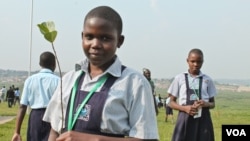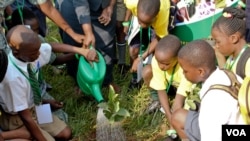Last weekend Uganda hosted the first Children's Climate Change Conference, where hundreds of young delegates shared their ideas on how to tackle a growing global problem.
Eleven-year-old Neolla Taaka is pretty sure that sooner or later, her life is going to be affected by climate change.
“I would think that most people around would not be able to get enough food, the drought would be high, we may be forced to migrate. But also I would think that the lifestyle of people would change. Like, if you have been having enough water to drink you would not be able to, you would have to walk long distances," said Taaka.
Last Saturday, Taaka and her classmates presented their thoughts on climate change to an audience of their peers. This was the International Children’s Climate Change Conference in Kampala, Uganda, reportedly the first of its kind.
The conference was organized by Joseph Masembe, who runs a local organization called Little Hands Go Green. He says he was looking for a way to make the concept of climate change relevant to ordinary Ugandans, an idea he got two years ago while attending the U.N. Climate Change Conference in Doha.
“When I sat there it was greenhouse gas emissions, and these people have not ratified the Kyoto Protocol, and the Bali conference, and on and on. But I looked at the average Ugandan and I thought, ‘What can they do? Let us get the simple aspects of it. Let me create a climate change conference that is hinged around children,'" said Masembe.
More than 200 children came from schools around Uganda, including international schools; Masembe says 35 nationalities were represented. Each school gave a presentation on how Ugandans can help tackle the global crisis.
“Some of your vehicles, when you are driving around town, the vehicle it is just producing only dangerous gases and it can not stop producing them. So, I would advise you to discourage movement by vehicles over short distances.”
Masembe says he was impressed by what they had to say.
“I am actually shocked at where these children got all these ideas, because we do not have environmental conservation education in the national curriculum. It is not there at all. Because you see, we are naturally endowed, so we do not realize that we are losing our on our vegetation cover. We believe it is there. We are the Pearl of Africa, and people just wake up and live like that," he said.
But he says the effects of climate change are already being felt.
“Weather patterns have started to change a lot. Farmers in the villages are telling you that the rainy season is not what it used to be. Now we have torrential rains, we have mudslides. When it rains in Kampala places get flooded. This was not the trend before," eh said.
Young delegates like 10-year-old Patricia Gukiina were not impressed with how adults have been handling the environment.
“I think they do not take into practice what they say," said Gukiina. "They tell us to plant trees, but they do not. [They say] ‘do as I say, but not as I do.’”
Taaka hopes even though they are still kids, her generation can change that.
“When kids are involved the adults can think, ‘Hmm, how can they be younger than us and yet they are doing it?’ If they are involved they will inspire other people to do it," said Taaka.
Masembe plans to make the conference an annual event, and to eventually hold regional conferences around East Africa. Such events help plant the seed of environmentalism in the next generation, he says, one young delegate at a time.





